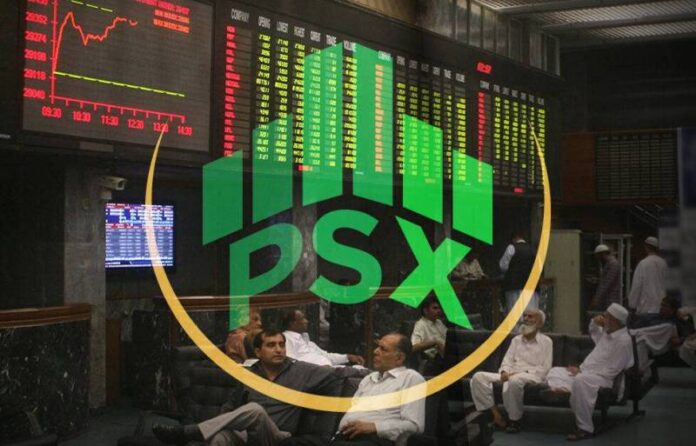KARACHI, May 9: The Pakistan Stock Exchange (PSX) endured one of its steepest intraday declines in recent years on Thursday, with the benchmark KSE-100 Index closing at 103,526.81 — down by 6,482.21 points or 5.89% — as tensions between Pakistan and India intensified following fresh military actions.
After opening on a positive note and gaining as much as 1.75% in early trade, the market quickly reversed course when reports emerged of another wave of Indian drone attacks in the morning. At around 12:40 pm, the index had crashed by over 6% to 103,060.30, prompting a rare temporary suspension of trading.
When the market resumed at 1:39 pm, the selling pressure deepened, with the index falling to 101,839.92 by 2:10 pm — down over 8,100 points or 7.42% intraday — before slightly recovering by the close.
Investor sentiment turned sharply negative following confirmation from the Pakistan military that India had launched “another blatant act of military aggression” by sending 12 Harop drones to multiple locations in Pakistan. The military spokesperson stated that all 12 drones were intercepted and neutralised, but the incident heightened fears of a wider regional conflict.
The downturn affected nearly all major sectors, including banks, oil & gas, cement, automobile assemblers, fertiliser, and refineries. Blue-chip stocks such as HUBCO, OGDC, PPL, MARI, PSO, ARL, NBP, and UBL were deep in the red, contributing significantly to the index’s decline.
Thursday’s sharp drop follows an already volatile week in which the KSE-100 had initially declined over 6% on Wednesday after Indian missile strikes killed at least 31 civilians and wounded over 50 people in Pakistan. The losses were partially recovered by the close of that session, but Thursday’s renewed hostilities sent markets back into freefall.
The escalation comes amid growing cross-border hostilities not seen since the 1999 Kargil conflict, with the National Security Committee (NSC) authorising Pakistani armed forces to take “corresponding measures.” Pakistan retaliated to earlier Indian strikes by downing five Indian Air Force jets, including three Rafale fighters.
Despite significant positive domestic triggers — including a 100bps interest rate cut by the central bank, a historic low inflation print of 0.3% for April 2025, and the upcoming IMF board meeting on May 9 for Pakistan’s programme review — geopolitical risks have completely overshadowed market fundamentals.
Market observers noted that unlike prior incidents such as the 2019 Pulwama-Balakot crisis or the 2016 Uri strikes, the current bout of escalation has sparked a far more intense market reaction. Over the past nine trading sessions (April 23 to May 6), the PSX had already shed 4.1% amid rising anxiety over a potential military conflict.
Interestingly, despite the market crash, Pakistan’s international debt instruments showed a mixed response. Yields on Euro and Sukuk bonds improved slightly by 18–61 basis points after a significant rally earlier this month, which had seen average yield compression of 160bps.
As the situation remains fluid, investors are expected to stay cautious ahead of Friday’s IMF board review and any further geopolitical developments.




